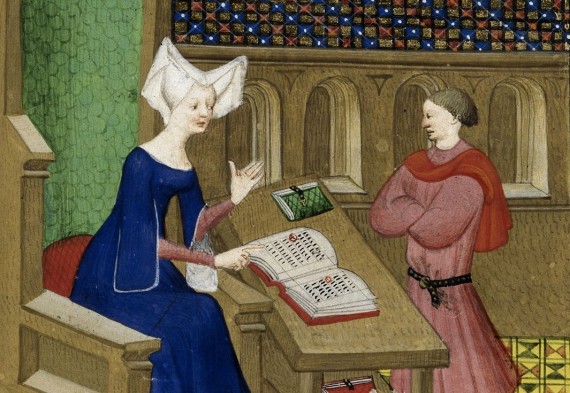By Danièle Cybulskie
Yesterday, I stumbled across a passage from the Liber Manualis, written by a ninth-century Frankish woman named Dhuoda to her fifteen-year-old son. Believing that she was dying (the date of her actual death is unknown), Dhuoda poured herself into the task of giving her son all of the life lessons she would not be able to impart herself. What is left to us is a unique example of the power and wisdom of a medieval mother’s love.
At the time of writing, William and Dhuoda are separated, as she writes, “I have heard that your father, Bernard, has given you as a hostage to the lord king Charles [the Bald]” (p.126), but it’s very likely that Dhuoda has not seen her son for years already at this point. Not only was it common for the nobility to send their sons away to be educated at other nobles’ houses, but the Frankish conflict seems to have kept the family apart quite a lot: William’s younger brother was only, Dhuoda says, “the second [child] to come forth from my body” (p.125), and his birth came fifteen years after William’s. (Miscarriage might explain this somewhat, but long absence seems to have been a defining feature of Dhuoda’s marriage.)
One of the tasks Dhudoa sets William is to pass on her wisdom and love to his younger brother. In a heartbreaking example of the relative powerlessness of many medieval noble women’s lives, Dhuoda’s second son was taken from her by his father within days of his birth. Dhuoda says, “He was still tiny and had not yet received the grace of baptism when Bernard, my lord and the father of you both, had the baby brought to him in Aquitaine in the company of Elefantus, bishop of Uzès, and others of his retainers” (p.125). Dhuoda herself was not permitted to go with them, since, as she says, “my lord constrains me to remain in this city” (p.125). Although her son was born in March, when she writes the Liber Manualis between December and February, she calls him “your little brother, whose name I still do not know” (p.126). It seems Dhuoda was a virtual prisoner with little to no knowledge of her sons’ whereabouts, well-being, or even the name of her own baby (his father, perhaps not shockingly, named the baby Bernard). It’s no wonder that she says that the impetus for writing the Liber Manualis comes from feeling “anxious and filled with longing to do something for [William]” (p.124), or that she feels compelled to implore William to take care of his little brother on her behalf: “to teach him, to educate him, to love him, and to call him to progress from good to better” (p. 126).
Much of the Liber Manualis is advice on how to be a good Christian, but there are some other interesting bits of wisdom Dhuoda writes down along the way. Dhuoda sets out the goal for every noble boy when she writes, “What is essential, my son William, is that you show yourself to be such a man on both levels that you are both effective in this world and pleasing to God in every way” (p.125). In addition to teaching him all she knows about spiritual matters and the importance of relying on God in times of trouble, Dhuoda educates William on the important facts of his family life, setting down the dates of his parents’ wedding, his birth, and his younger brother’s birth. This is the type of knowledge that mothers still pass on to their children, and Dhuoda finds it critical enough that she sets it down in writing for William to be able to refer to it later. Interestingly, Dhuoda also asks William to be sure to read a lot, saying, “I urge you, O my handsome and beloved son William, that you not be distracted by the mundane cares of this earthly world from acquiring many volumes. In these books you should seek out and learn from the wise men of the church, the holiest of masters” (p.126). Finally, she asks him to carefully pay her debts if she should die before taking care of them herself, humbly admonishing herself for overspending from time to time.
What I love about the Liber Manualis is that, while she expectedly puts herself down for being unworthy of salvation, Dhuoda recognizes her own worth as a pivotal part of her sons’ lives. She writes, “My son, my firstborn son – you will have other teachers to present you with works of fuller and richer usefulness, but not anyone like me, your mother, whose heart burns on your behalf” (p.126). While she may be separated from her sons, she knows the strength and value of a mother’s love, and part of her teaching is telling William (and, by proxy, Bernard) how much he is loved.
At the end of her book, Dhuoda calls for God’s blessing on her husband and sons, that they may be “happy and joyful in the present world” (p.127), successful, and worthy of a place in heaven. For herself, she entreats William and any other readers to pray for her in her “fear and grief” (p.127) at the prospect of her own death. Dhuoda very specifically writes, “And as for any other who may someday read the handbook you now peruse, may he too ponder the words that follow here so that he may commend me to God’s salvation as if I were buried beneath these words” (p.129). Because I have shared other parts of her story with you, I think it’s only fair to fulfill her last wishes and end with those words she is so concerned with. Here is Dhuoda’s self-written “epitaph”: the last words of a ninth-century Frankish mother:
Find, reader, the verses of my epitaph:
Formed of earth, in this tomb
Lies the earthly body of Dhuoda.
Great king, receive her.
The surrounding earth has received in its depths
The flimsy filth of which she was made.
Kind king, grant her favor.
The darkness of the tomb, bathed with her sorrow,
Is all that remains to her.
You, king, absolve her of her failings.
You, man or woman, old or young, who walk back and forth
In this place, I ask you, say this:
Holy one, great one, release her chains.
Bound in the dark tomb by bitter death,
Closed in, she has finished life in earth’s filth.
You, king, spare her sins.
So that the dark serpent
Not carry away her soul, say in prayer:
Merciful God, come to her aid.
Let no one walk away without reading this.
I beseech all that they pray, saying:
Give her peace, gentle father,
And, merciful one, command that she at least be enriched
With your saints by your perpetual light.
Let her receive your amen after her death.
All quotes are taken from Women’s Lives in Medieval Europe: A Sourcebook (the 1993 edition), but you can find the entire translation of Dhuoda’s book in Carol Neel’s Handbook for William: A Carolingian Woman’s Counsel for Her Son.
You can follow Danièle Cybulskie on Twitter @5MinMedievalist
















Pentru a putea adăuga comentarii trebuie să fii membru al altmarius !
Alătură-te reţelei altmarius